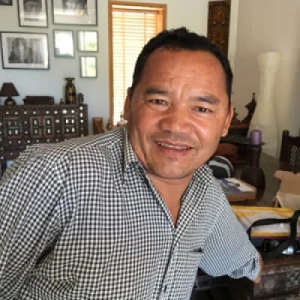Are you interested in climbing a peak in Nepal? Then you are at the right place. The Island Peak is one of the most famous trekking peaks, ideal for beginner climbers. Even if you are not new to climbing, you will enjoy climbing this peak. The physical demands of Island Peak climbing are very high, but the climbing route is not technically challenging.
Island Peak Climbing with EBC Cho La & Kongma La is a 21-day adventurous expedition in Nepal. This trip involves trekking and climbing. The journey is challenging but very rewarding. You will explore the lap of Mount Everest and cross two famous passes. The trail traverses from lush valleys and beautiful Sherpa villages to glacier moraines and the summit of Island Peak.
Unlike the 7000m and 8000m mountains, you do not have to spend many days at the base camp of Island Peak acclimatizing. Instead, you will push to the summit right away. This is possible because you will be spending a few days trekking and getting used to high altitudes before the climbing starts.
Our Island Peak climbing itinerary involves hiking to Everest Base Camp and Kala Patthar. Not only that, but the participants also cross Cho La and Kongma La. Altogether, you will spend 12 days trekking before arriving at the Island Peak Base Camp. It allows you to acclimatize and build your stamina and confidence.
Crossing Cho La and Renjo La will boost your confidence and prepare you mentally for Island Peak. We have curated this itinerary to increase the success rate for beginner climbers. Reduce the trekking days if you have previous climbing experience and do not need long acclimatization time.
Highlights
- Conquer a 6000 meters fantastic mountain in the Himalayas
- Enjoy an adventurous trek through rhododendron forests and Sherpa villages of the Khumbu region
- Experience the thrilling Lukla flights and explore famous villages like Namche Bazaar
- Go on side hikes to the Hotel Everest View, Thame, Gokyo Ri, and Kala Patthar
- Explore the stunning Gokyo Lakes and reach the Everest Base Camp
- Get to see the mountain lifestyle of the locals and their ancient culture
- Cross Cho La and Kongma La passes
- Climb Island Peak
- Witness heavenly landscapes and jaw-dropping mountain vistas
What to expect during this climbing trip in Nepal?
Island Peak is known as Imja Tse in the Nepali language. When seen from higher mountains, this peak looks like an Island between a sea of mountains, which is why it is named Island Peak. Tenzing Norgay and Edmund Hillary gave this name to Imja Tse in 1953 during their Mount Everest expedition.
During the Island Peak Climbing with EBC Cho La & Kongma La, you will see beautiful landscapes that range from lush valleys to barren hills. Rivers, waterfalls, and streams change to moraines and glaciers.
Our itinerary includes multiple side hikes to viewpoints from where you will see gorgeous sunrises and breathtaking mountain panoramas. On this trip, participants see the finest mountain views from day one.
Trekkers see Thamserku, Kongde Ri, Everest, Lhotse, Nuptse, Ama Dablam, Island Peak, Makalu, Cho Oyu, Kanchenjunga, Cholatse, and numerous other mountains. The view from the top of Island Peak is heavenly.
Our Island Peak climbing itinerary allows you to explore the Khumbu region, home to the Sherpa community. If you have not explored this region yet, this is a golden opportunity. Explore famous villages like Lukla, Phakding, Namche Bazaar, Gokyo Village, Tengboche, Dingboche, etc.
Likewise, you will come across many old stupas and monasteries on the way. The trail ascends and descends across various climatic zones, so you will also discover different vegetation. Navigate the Ngozumpa glacier moraines on the way to Gokyo Village. It is the biggest glacier in Nepal.
Witness the stunning beauty of the Gokyo Lakes and cross the Cho La Pass. The trail then ascends to Everest Base Camp, the lap of the tallest mountain in the world. You will take a side hike to Kala Patthar, then cross the Kongma La Pass to enter Chhukung Valley.
From here, hike to the Island Peak Base Camp. Spend a night at the base camp in our comfortable alpine tents and start climbing towards the summit of Island Peak. You will scale the summit and return to Chhukung village the same day. Therefore, you will not spend more than one night above 5,000 meters.
Island Peak Climbing route
The Island Peak climbing route involves mostly steep snow-covered slopes. From the base camp, you will follow rocky terrain and ascend to the glacier.
The route goes above the ride and crosses a steep snow headwall that leads to the summit. The final ascent involves a 60- 70-degree face about 150 meters tall.
Pre-climbing training
If you are new to climbing, our pre-climbing training will be very valuable for you. At the Island Peak Base Camp, your team leader will teach you some basic climbing techniques. He will teach you how to ascend and descend using fixed ropes and other climbing gear. The training will make you mountain-aware and confident.
Who can do the Island Peak Climbing with EBC Cho La & Kongma La 21 days?
Island Peak is one of the best trekking peaks in Nepal if you want to start mountaineering. Climbing this peak provides a great introduction to the alpine environment and mountaineering.
Because there are no technical challenges, beginner climbers can climb Island Peak. You will hone your climbing skills and build strong physical and mental resilience, which will help you during higher-peak climbing expeditions.
How do you prepare for Island Peak climbing with Everest Base Camp?
To prepare for Island Peak climbing, participants must build their strength and stamina. Regular exercise and muscle building are required. You have to be physically and mentally strong to push yourself in thin air and low oxygen levels. High-intensity workouts, aerobic exercise, long walks with weights, etc, are recommended.
If you have any questions, feel free to contact us. Our team will help you throughout the journey to make it successful. You will get the best Island Peak Climbing with EBC Cho La & Kongma La cost and service with us. Bookings are open 2024/2025 climbing seasons.






